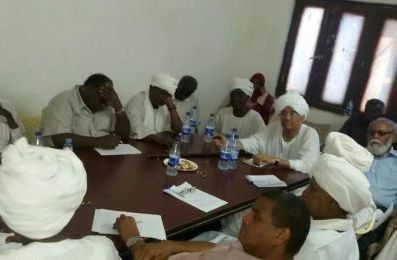Sudanese opposition sceptical of NCP’s commitment to national dialogue
March 13, 2015 (KHARTOUM) – Sudan’s opposition alliance of the National Consensus Forces (NCF) reiterated its rejection to take part in the national dialogue and expressed doubts on the seriousness of the ruling National Congress Party (NCP) to negotiate comprehensive peace and constitutional reforms.

The meeting which was sponsored by the German government also decided that the SRF and NUP will represent the “Sudan Call” forces, stressing that no dialogue can be held before implementing the confidence building measures provided in the African Union roadmap to facilitate the internal political process.
The opposition NCF said in a statement extended to Sudan Tribune on Friday that a joint meeting of its parties’ heads and general commission discussed on Wednesday recent political developments particularly the Berlin Declaration.
The statement disclosed that the NCF refused to participate in the preparatory meeting and repeated it would not engage in dialogue with the regime unless it implements conditions stated in its various charters including the Berlin Declaration.
It further questioned the seriousness and credibility of the regime to engage in a productive dialogue.
The NCF described the ruling party’s statement regarding the Berlin Declaration as mere “manoeuvring and wordplay, and brought nothing new”.
”
The NCP political secretariat, in a statement on Monday, welcomed the Berlin Declaration saying it agrees to any meetings or understandings that would lead to everyone’s participation in the national dialogue.
“The roadmap approved by the National Dialogue General Assembly is the basis for any meetings or understandings aimed at involving everyone in the national dialogue, which is based inside Sudan,” further underlined the statement of the ruling party.
The opposition parties expressed support to recent protests and sit-ins, stressing the need to develop the political performance of the NCF and commitment to toppling the regime through popular uprising.
The meeting further renewed calls for releasing NCF chairman, Farouk Abu Issa, and prominent rights activist Amin Mekki Madani, and said the regime failed to prove terrorism charges it filed against them.
The government welcomed the outcome of Berlin Declaration despite its rejection to the “Sudan Call” and the continued detention of the opposition leaders who signed this call for a negotiated solution to end war and bring democratic reforms in Sudan.
However observers in Khartoum say the security service did not prevent their travel to the meeting or arrest them after their return because the Sudanese authorities was approached by the German government.
Sudan’s president Omer Hassan al-Bashir launched the national dialogue initiative a year ago in which he urged opposition parties and rebels alike to join the dialogue table to discuss all the pressing issues.
But the initiative faced serious setbacks after the government refusal to create suitable atmosphere by releasing political prisoners, ensuring freedoms, and postponement of elections.
The National Umma Party (NUP) led by al-Sadiq al-Mahdi withdrew from the process in protest of al-Mahdi’s arrest last May.
Later on, several political parties including the Reform Now Movement (RNM) led by Ghazi Salah al-Din and the Just Peace Forum (JPF) led by al-Tayeb Mustafa and the Alliance of the Peoples’ Working Forces (APWF) announced they had decided to suspend participation in the national dialogue until the requirements of a conducive environment are met.
(ST)
